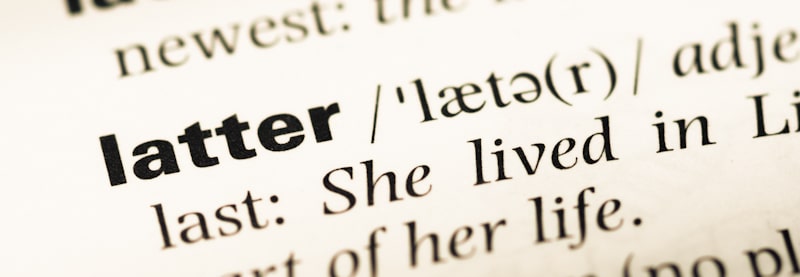Not all “old-fashioned” or “archaic” English terms get adopted into the modern lexicon. A lot more than a handful go under the ax or get replaced by a new term altogether. Only a few manage to age well or remain in their original shape and form for centuries, like the words “former” and “latter”.
The words “former” and “latter” do not mean the same or cannot be used interchangeably in texts. “Latter” is, in fact, the opposite word of “former”. The two terms can be used in the same sentence to indicate an item in a sequence or can be used individually. Also, the two have alternate meanings.
Keep reading to learn more about the two terms’ meanings and origins, how to use them in various writing scenarios, how not to get confused between them, etc.

“Former” – Definition
The word “former” denotes an item’s positioning in a sentence or two-part sequence. It indicates the first part in a given sequence. The term “former” could also be used to denote other meanings, such as “having once been or previously been” and “a title or role held previously”.
The term “former” has its roots in the Old English term “forma”, which means “first”. During the 12th century, the term “former” was used to denote “first or earliest in order or time”. During the late 1500s, “former” assumed its primary meaning, “first of two”.
“Former” is also believed to have first shown up as a word during the 1100s. It was considered equivalent in meaning to the word “forme”, meaning “preceding in time”.
“Latter” – Definition
Like “former”, “latter” also indicates the positioning of an item in a two-portion sequence. It denotes the second or last part of the series.
Like “former”, “latter” has Old English roots as well. It’s derived from the term “lætra”, which is comparable to the word “late”. The existing meaning of “latter” was assumed during the 1550s. Not to mention, the term “latter” is connected to “later”.
Besides meaning “the second mentioned in a sequence of two”, the term “latter” could also mean something that’s “advanced or forward in time” and “close to the end”.
Using “Former” in Writings
As mentioned above, the adjective “former” can mean multiple things – mainly two things, however. The following are a couple of sentences in which the word denotes “the first among a couple of things mentioned”.
- Both dogs and cats are popular pets, but the former tends to be more synonymous with the word “pet”.
- The jungles have both sloths and monkeys, but the former isn’t as swift with their movements.
When not used in conjunction with “latter” or not denoting a part of a sequence as a standalone term, the word “former” could be used to (as mentioned above) indicate something that existed in the past. For example:
- During the former phase of the meeting, important points were covered.
The more popular meaning of “former” relates to “roles, titles, positions, etc. held in the past”. Here are a couple of sentences incorporating the word in relation to that meaning:
- The former player said the politics in and surrounding the club forced him to announce his retirement early.
- The former California governor’s stance on the issue has changed.
The term “former” is also commonly used in a phrase or expression: “a shadow of your former self”. It means “a person or someone has come down in greatness over a period or is not the wonderful individual they once used to be”. For example:
- Tom played sports like a real athlete. These days, however, he just doesn’t feel like playing any sport. He is not merely a shadow of his former self, which is quite unfortunate and sad.
Using “Latter” in Writings
Like “former”, “latter” could be incorporated into texts or writings with slightly different meanings. In other words, it could be used to mean “the second item in a two-part sequence” and also “the last thing in a sequence”. Here are a couple of sentences demonstrating the same, respectively:
- The dish uses both milk and butter, but the latter is the most essential item of the two.
- During the latter phases, massive strides were made in the field.
Unlike “former”, “latter” could be used in sentences or texts that have more than two items in a sequence. More on that is discussed below.

“Former” and “Latter” – Beating the Confusion, and Some Usage Recommendations
“Former” and “latter” are both adjectives. Since the two terms are used in similar contexts, getting confused between them is not that difficult.
The easiest way to remember the difference between the two terms is by remembering their respective meanings.
- In a given sentence, “former” is typically the thing mentioned “first”.
- “Latter” basically denotes anything that’s mentioned “second” or “last” in a sequence.
If you cannot possibly remember the meanings of “former” and “latter”, remember this mnemonic trick: “F” stands for first, and “L” for last. Recalling that when using either of the terms should help you remember their respective meanings.
If these mnemonic tricks don’t work, remember “former” and “latter” alphabetically, or the letter “f” comes before the letter “l”.
Usage Recommendations
The words “former” and “latter” help you point out subjects or specific parts in a two-sequence sentence without repeating them. The two terms help with succinctness and are commonly used in technical or formal writing – not much in casual speech, though.
However, there are a few things you must be wary of when incorporating two or either of the terms in your writings.
First, it’s not good practice to overuse “former” and “latter” in your texts. It could result in your readers having difficulty associating specific subjects with the words “former” and “latter”, or they may have to resort to too much going back and forth while reading.
Also, the two words shouldn’t feature in a sentence or text where more than two things are being discussed. The following usage, for example, is incorrect:
- Her hobbies are drawing, playing the guitar, and collecting stamps, but the latter is what she loves to do the most.
The sentence could instead be written as:
- Her hobbies are drawing, playing the guitar, and collecting stamps, but the third activity is what she loves to do the most.
You may even replace “third activity” in the sentence with the phrase “stamp collecting” itself.
In informal writings, using “former” or “latter” in a sentence that consists of a sequence of three or more items may be acceptable. For example:
- Out of apples, mangoes, and strawberries, she eats only the latter.
Since “latter” can also be used to mean “last”, the term denotes “strawberries” in the sentence above. Kindly note, unlike “latter”, “former” is almost never used to mean the first thing in a list, even in informal texts. Ordinal numbers could be used instead.
Example Sentences with the Word “Former”
As mentioned above, the word “former” is also used to denote something that existed before – a rank, official position, etc. Some of the sentences below use the word “former” assuming that definition:
- Both rabbits and polar bears look cute, but the former is the more “ideal” pet.
- Blue and red are popular hues, but the former is a tad more loved.
- Mary is Tom’s former wife.
- She met her former employer at the trade fair.
- He is my former student.
- Our organization has just hired Martin, who was formerly with Todd & Co.
- He was formerly married to my good friend, Jenna.
Example Sentences with the Term “Latter”
As mentioned above, “latter” can also denote the last item in a sequence of three or more things. Some of the sentences in the list below may have adopted “latter” considering the alternate meaning:
- The Flintstones and The Simpsons are both excellent shows, but my favorite is the latter.
- If offered to choose between exile and death, she said she would opt for the latter.
- The item comes in both metal and wood, but I like the latter variant more.
- Of fish, meat, and chicken, he loves the latter the most.
- The game’s latter half was quite exciting.
- She’ll go to school during the latter phase of the year.
Example Sentences That Employ Both “Former” and “Latter”
It’s not very common to see both “former” and “latter” used in the same sentence. But those occurrences are not rare either. The following are a few sentences that incorporate both the terms:
- Of the two options available, the former is more budget-friendly, while the latter has the “durability” aspect going for it.
- I like reading both Reader’s Digest and People Magazine but prefer the former over the latter.
- You may visit either the West Wing or East Wing of the historical museum. The former has Native American art on display, while the latter exhibits Roman art.
Conclusion
To conclude, “former” and “latter” are different words from all possible angles – be it with their spellings, pronunciations, or meanings. They are used in a sentence as a pair or as standalone terms to denote items in a sequence.
The words are almost never used in strings that consist of three or more items. However, “latter” can be used in multi-sequence sentences in informal writings. Remember these rules and the meanings of the two words to use them correctly in your texts.
Shawn Manaher is the founder and CEO of The Content Authority. He’s one part content manager, one part writing ninja organizer, and two parts leader of top content creators. You don’t even want to know what he calls pancakes.


